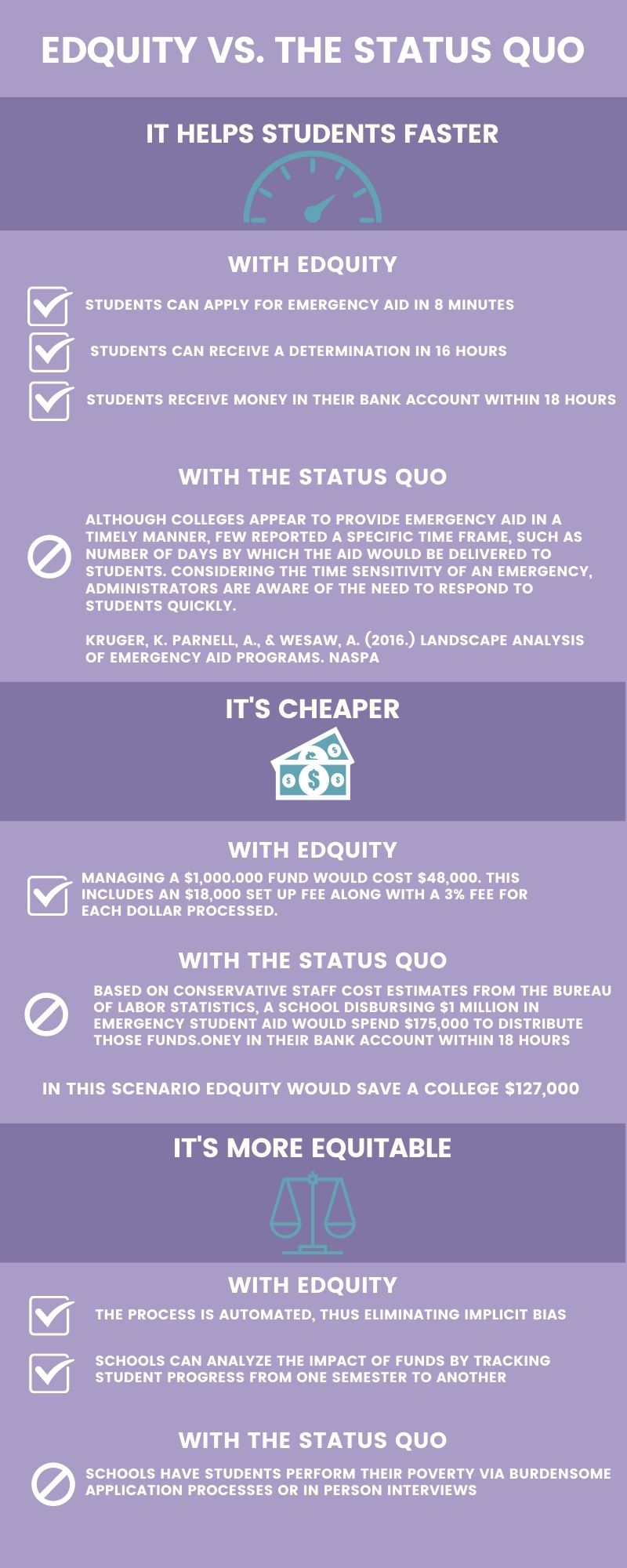The recent $1.9 trillion COVID-19 relief package passed by Congress includes $40 billion for higher education, $5 billion of which is allocated for California. As part of the package, schools receiving funds must give half to students in the form of emergency financial aid. Additionally, Governor Newsom’s proposed budget for the year also directs millions to California Community Colleges, California State University, and the University of California system in support of emergency grants and other financial assistance to students. With this cash infusion, California’s colleges and universities have an unprecedented opportunity to close the equity gap in emergency student aid management and distribution.
The Emergency Aid Distribution Disaster
Currently, emergency student aid distribution remains in the Dark Ages. Antiquated processes at under-resourced institutions are slow to respond to student needs, while perpetuating biases that impede students’ ability to graduate. Typically, emergency aid applications must pass through multiple hands, committees, and departments before an approved student receives funds in their bank account. Some schools require interviews that force students to perform their poverty to a staffer who then will decide whether the performance deserves an emergency grant. Also, implicit bias often plays a role in the decision-making process. Beyond those challenges, 68% of institutions with emergency aid programs fail to analyze data regarding students receiving the aid so insights on its impact on graduation rates are virtually nonexistent. All these inefficiencies result in a bureaucracy that fritters away hundreds of millions of dollars aimed at helping students.
The Cost-Savings Solution
Michelson 20MM portfolio company Edquity is modernizing and optimizing emergency student aid by developing the first evidence-based and research-informed emergency aid application. A proprietary algorithm determines funding distribution while maximizing student retention and targeting those most in need. Edquity has the potential to transform the emergency student aid landscape by allowing students to complete an application within minutes, receive a decision in hours, and claim funds within the day.
Bringing Edquity to a mid-sized California college would require a $18,000 setup fee along with a 3% fee for each dollar processed. As an example, it would cost a school $48,000 to distribute $1 million. Based on conservative staff cost estimates from the Bureau of Labor Statistics, a school disbursing $1 million in emergency student aid would spend $175,000 to distribute those funds. In this scenario, Edquity’s platform saves a college $127,000.

It’s Ultimately About Equity
Automating emergency student aid processes identifies the right students, helps them in a timely manner, and eliminates implicit bias by removing humans from decision-making. Edquity also has the ability to analyze the impact of funds by tracking student progress from one semester to semester. At Compton College, Edquity helped administrators manage emergency aid dollars with tremendous results–students requested assistance via the Edquity app in under eight minutes, obtained a decision in sixteen hours, and received money in their bank account within eighteen hours. Outcomes data indicate that students who received funds through Edquity graduated at twice the rate as those who received nothing.
Schools have expressed cost concerns related to adopting a tool such as Edquity regardless of whether their institution has enough emergency aid funding to disburse. As recent legislation extends between $866,550 and $30 million to each California community college, the question isn’t whether California’s schools can afford to implement Edquity, but rather, how can they afford not to?
Additional Resources
- Landscape Analysis of Emergency Aid Programs (National Association of Student Personnel Administrators, 2016)
- #RealCollege 2020: Five Years of Evidence on Basic Needs Insecurity (The Hope Center for College, Community, and Justice, 2020)
Michelson 20MM was founded thanks to the generous support of renowned spinal surgeon and inventor Dr. Gary K. Michelson and his wife, Alya Michelson. The Michelson 20MM Foundation is dedicated to supporting and investing in leading organizations, technologies, and initiatives that seek to transform learning and improve access to educational opportunities that lead to a meaningful career. Learn more at www.20mm.org.

